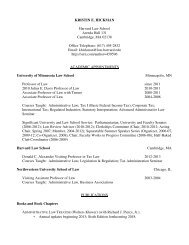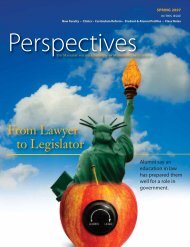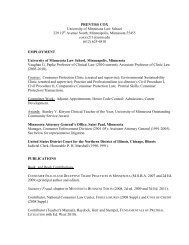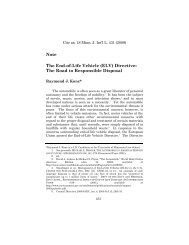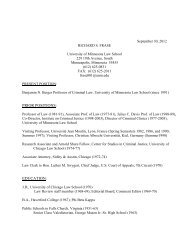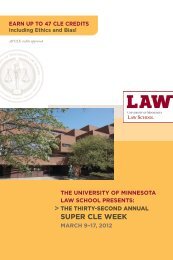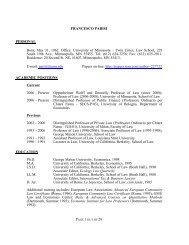Enabling Private Ordering - the University of Minnesota Law School
Enabling Private Ordering - the University of Minnesota Law School
Enabling Private Ordering - the University of Minnesota Law School
You also want an ePaper? Increase the reach of your titles
YUMPU automatically turns print PDFs into web optimized ePapers that Google loves.
2009] UMBRELLA CLAUSES 43<br />
rules on attribution <strong>of</strong> conduct to <strong>the</strong> State under <strong>the</strong><br />
international law rules on State responsibility. 107 For instance,<br />
with respect to <strong>the</strong> conduct <strong>of</strong> a State organ under Art. 4 <strong>of</strong> <strong>the</strong><br />
International <strong>Law</strong> Commission’s Articles on State<br />
Responsibility, <strong>the</strong> relevance <strong>of</strong> <strong>the</strong> distinction between<br />
commercial and sovereign acts has been expressly denied by <strong>the</strong><br />
Commission. As <strong>the</strong> <strong>of</strong>ficial commentary on <strong>the</strong> Articles states:<br />
“[i]t is irrelevant for <strong>the</strong> purposes <strong>of</strong> attribution that <strong>the</strong> conduct<br />
<strong>of</strong> a State organ may be classified as ‘commercial’ or as ‘acta iure<br />
gestionis.’” 108 The commentary fur<strong>the</strong>r stresses that “entry into<br />
or breach <strong>of</strong> a contract by a State organ is none<strong>the</strong>less an act <strong>of</strong><br />
<strong>the</strong> State for <strong>the</strong> purposes <strong>of</strong> article 4,” 109 just as traditional<br />
sovereign conduct is.<br />
Presumably, <strong>the</strong> idea underlying <strong>the</strong> distinction between<br />
governmental and commercial conduct is that only sovereign<br />
breaches <strong>of</strong> an investor-State contract constitute a political risk,<br />
whereas commercial breaches are equally possible when<br />
contracting with a private actor and thus do not increase <strong>the</strong><br />
risk <strong>of</strong> contracting with a sovereign. 110 Yet <strong>the</strong> difference<br />
between <strong>the</strong> host State and normal private parties, even as<br />
regards commercial breaches, is that <strong>the</strong> latter are not <strong>the</strong>ir<br />
own judges in <strong>the</strong>ir own courts. Unlike private parties, <strong>the</strong> host<br />
State is able to control <strong>the</strong> way <strong>the</strong> law is applied by its own<br />
courts and is <strong>the</strong>refore not able to provide independent thirdparty<br />
dispute settlement that would enable it to make credible<br />
commitments. 111 The situation between contracts between<br />
private parties and investor-State contracts is, <strong>the</strong>refore, not<br />
comparable. 112<br />
Interpreting umbrella clauses restrictively does not only<br />
107. See also James Crawford, Treaty and Contract in Investment Arbitration,<br />
TRANSNAT’L DISP. MGMT., Jan. 2008, at 6–7.<br />
108. JAMES CRAWFORD, THE INTERNATIONAL LAW COMMISSION’S ARTICLES ON<br />
STATE RESPONSIBILITY, 96 (2002).<br />
109. Id. (citing Swedish Engine Drivers Union Case, 20 Eur. Ct. H.R. (ser. A) at<br />
14 (1976); Schmidt and Dahlström, 21 Eur. Ct. H.R. (ser. A) at 15 (1976)). The ILC<br />
commentary to <strong>the</strong> Articles on State Responsibility fur<strong>the</strong>r adds that “[t]he<br />
irrelevance <strong>of</strong> <strong>the</strong> classification <strong>of</strong> <strong>the</strong> acts <strong>of</strong> State organs as iure imperii or iure<br />
gestionis was affirmed by all those members <strong>of</strong> <strong>the</strong> Sixth Committee who responded<br />
to a specific question on this issue from <strong>the</strong> Commission . . . .” CRAWFORD, supra<br />
note 108, at 96 n.118.<br />
110. This proposition is, however, supported by those tribunals and<br />
commentators that endorse <strong>the</strong> dualist distinction between <strong>the</strong> State as a regulator<br />
and <strong>the</strong> State as a merchant.<br />
111. See supra Part II.B.1<br />
112. See Mayer, supra note 19, at 5.




